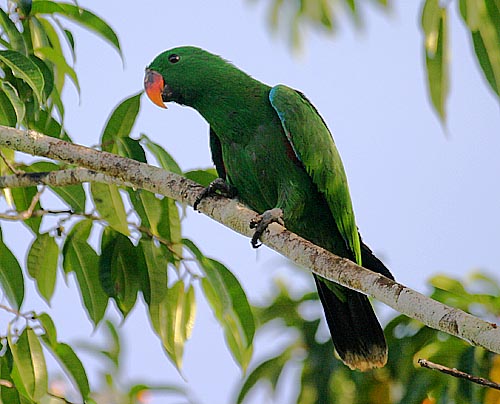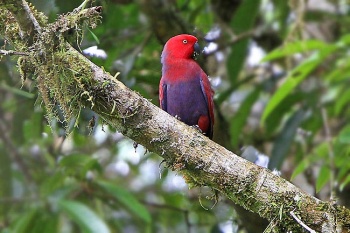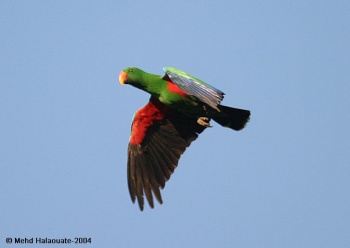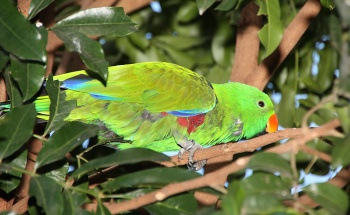- Eclectus roratus
Identification
35–42 cm (13¾-16½ in)
Male
- Bright green body
- Blue or red tail and wings
- Orange upper mandible becoming yellow at tip
- Black lower mandible
- Yellow-orange iris
Female
- Red body
- Blue or purple belly
- Black bill
- Yellow-orange iris
Distribution
Eastern Indonesia, New Guinea and surrounding islands, Cape York Peninsula in Queensland.(Australia), and Solomon Islands.
Taxonomy
Subspecies
Nine to twelve subspecies are recognized depending on the authority[1][2]
- E. r. vosmaeri: Larger islands in northern and central Moluccas
- E. r. roratus: Southern Moluccas (Buru, Seram, Ambon, Saparua and Haruku)
- E. r. cornelia: Sumba Island (Lesser Sundas)
- E. r. riedeli: Tanimbar Islands (Arafura Sea)
- E. r. aruensis: Aru Islands (New Guinea)
- E. r. biaki: Biak Island (off north-west New Guinea)
- E. r. polychloros: New Guinea, adjacent islands and archipelagos
- E. r. solomonensis: Admiralty Islands, Bismarck Arch. and Solomon Islands
- E. r. macgillivrayi: North-eastern Australia (extreme northern Queensland)
Three subspecies maforensis, pectoralis and westerman are generally considered invalid.
Habitat
Lowland forest, from the coast, including mangroves, to mid-montane. They are usually to be seen in the canopy.
Behaviour
Diet
The diet consists of fruits, nuts, blossom, leaf buds, and seeds.
Breeding
They nest in tree holes lined with wood chips. The clutch consists of 2 eggs which are incubated by the female (she is fed by the male) for 28 days. The young fledge about 8 weeks later.
References
- Template:Ref-Clements6thAug1#Avibase
- Handbook of the Birds of the World Alive (retrieved Nov 2017)
- Wikipedia
- Honolulu Zoo
Recommended Citation
- BirdForum Opus contributors. (2024) Eclectus Parrot. In: BirdForum, the forum for wild birds and birding. Retrieved 23 May 2024 from https://www.birdforum.net/opus/Eclectus_Parrot







